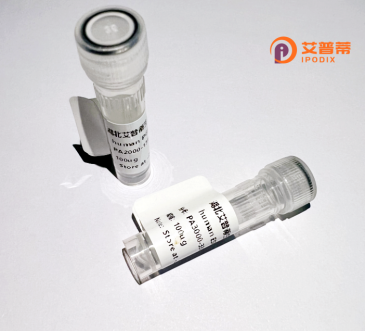
| 纯度 | >90%SDS-PAGE. |
| 种属 | Human |
| 靶点 | SCN2B |
| Uniprot No | O60939 |
| 内毒素 | < 0.01EU/μg |
| 表达宿主 | E.coli |
| 表达区间 | 1-215 aa |
| 活性数据 | MHRDAWLPRPAFSLTGLSLFFSLVPPGRSMEVTVPATLNVLNGSDARLPCTFNSCYTVNHKQFSLNWTYQECNNCSEEMFLQFRMKIINLKLERFQDRVEFSGNPSKYDVSVMLRNVQPEDEGIYNCYIMNPPDRHRGHGKIHLQVLMEEPPERDSTVAVIVGASVGGFLAVVILVLMVVKCVRRKKEQKLSTDDLKTEEEGKTDGEGNPDDGAK |
| 分子量 | 49.39 kDa |
| 蛋白标签 | GST-tag at N-terminal |
| 缓冲液 | PBS, pH7.4, containing 0.01% SKL, 1mM DTT, 5% Trehalose and Proclin300. |
| 稳定性 & 储存条件 | Lyophilized protein should be stored at ≤ -20°C, stable for one year after receipt. Reconstituted protein solution can be stored at 2-8°C for 2-7 days. Aliquots of reconstituted samples are stable at ≤ -20°C for 3 months. |
| 复溶 | Always centrifuge tubes before opening.Do not mix by vortex or pipetting. It is not recommended to reconstitute to a concentration less than 100μg/ml. Dissolve the lyophilized protein in distilled water. Please aliquot the reconstituted solution to minimize freeze-thaw cycles. |
以下是关于重组人SCN2B蛋白的3篇参考文献的简要概述:
1. **文献名称**: *"Functional co-expression of the beta 1 and type IIA alpha subunits of sodium channels in a mammalian cell line"*
**作者**: Isom, L.L., et al.
**摘要**: 研究了SCN2B(β2亚基)与Nav1.2通道(α亚基)共表达对钠通道功能的调节作用,发现β2亚基通过调节门控动力学和细胞黏附影响神经元兴奋性。
2. **文献名称**: *"A novel SCN2B mutation associated with arrhythmia and neurodevelopmental disorders alters Naᵥ1.5 channel gating"*
**作者**: Bendahhou, S., et al.
**摘要**: 报道了一种SCN2B基因突变导致钠通道功能异常,可能与心律失常及神经发育障碍相关,通过重组蛋白实验揭示突变对心脏钠通道门控特性的影响。
3. **文献名称**: *"Recombinant SCN2B protein modulates tetrodotoxin-sensitive sodium channels and neurite outgrowth"*
**作者**: Calhoun, J.D., & Isom, L.L.
**摘要**: 利用重组SCN2B蛋白证明其在神经元中的双重作用:不仅增强钠电流的快速激活,还通过细胞黏附信号通路促进轴突生长。
以上文献集中于SCN2B蛋白在电生理调节、疾病机制及神经发育中的功能研究,涵盖分子机制到病理关联的多元视角。
**Background of Recombinant Human SCN2B Protein**
The SCN2B protein, encoded by the *SCN2B* gene, is a regulatory β-subunit of voltage-gated sodium (Nav) channels, which are critical for initiating and propagating action potentials in excitable cells. As part of the β-subunit family (β1-β4), SCN2B (also termed β2 or β4. depending on splicing) modulates the trafficking, kinetics, and cell-surface expression of pore-forming α-subunits (e.g., Nav1.1-Nav1.9). It plays a role in cell adhesion and signaling through interactions with extracellular matrix proteins and other CAMs (cell adhesion molecules).
SCN2B is prominently expressed in the brain and heart, where its dysfunction has been linked to neurological disorders (e.g., epilepsy, autism spectrum disorders) and cardiac arrhythmias. Recombinant SCN2B protein is engineered in vitro using heterologous expression systems (e.g., mammalian or insect cells) to ensure proper post-translational modifications, such as glycosylation, which are essential for its functional interaction with Nav α-subunits.
Purified recombinant SCN2B serves as a tool for studying sodium channel regulation, disease mechanisms, and drug discovery. Its structural and functional characterization aids in unraveling pathophysiological pathways and identifying therapeutic targets for channelopathies.
×